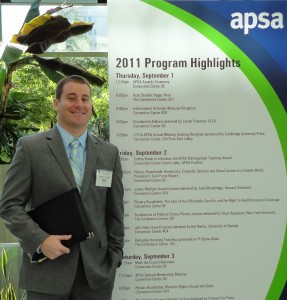Background
Update: I am currently serving as Lecturer at Santa Clara University, teaching courses including the Introduction to U.S. Politics, The Congress, The Presidency, Political Parties in the U.S., and Politics and Mass Media. The Santa Clara Political Science Department’s website can be found here.
Here at the University of Florida, I am a Ph.D. candidate in Political Science specializing in American Government, Political Behavior, and Political Methodology. After receiving my B.A. in Political Science, I moved to Washington, DC and worked on Capitol Hill while pursuing an M.A. in Political Management. Between the end of my time in Washington and the start of my tenure at UF, I taught American Government and Economics at Park Vista High School in my hometown of Boynton Beach, FL. In addition to my graduate studies and teaching at UF, I taught courses in American National Government and State & Local Government at Santa Fe College from 2008 to 2014, and I served as the American Government Field Chair for the Political Science Graduate Student Council from 2009 to 2011.
Education
M.A., Political Science (2011) University of Florida
M.A., Political Management (2006) The George Washington University
B.A., Political Science (2004) University of Notre Dame
Areas of Interest/Research
My research is primarily focused on the U.S. Congress, the behavior of its members, and its intersections with other aspects of American government and politics. In recent papers, my co-authors and I have examined the effects of partisanship, electoral competition, and district opinion on support for national direct democracy and have analyzed the results of a telephone experiment to get at the motivations of members of Congress to grant access to lobbyists and/or citizens.
My dissertation builds on classic theories of Congressional parties and behavior, arguing that, in the era of party polarization, institutional context affects party leadership styles and strategies and produces variance in conditional party government. More specifically, party leaders can be constrained or empowered by combinations of party status, presidential and bicameral politics, and degrees of polarization and will pursue different patterns of leadership based on their party’s institutional situation.
I have taught courses in American Federal Government, State & Local Government, and the American Presidency at the University of Florida. While my primary area of research is the U.S. Congress, I am also interested in the presidency, inter-institutional relations, political parties and interest groups, political behavior and elections, and American political development.
Contact Information
Email: matthewtharrigan@ufl.edu
Mailing address:
Department of Political Science
234 Anderson Hall
P.O. Box 117325
Gainesville, FL 32611-7325